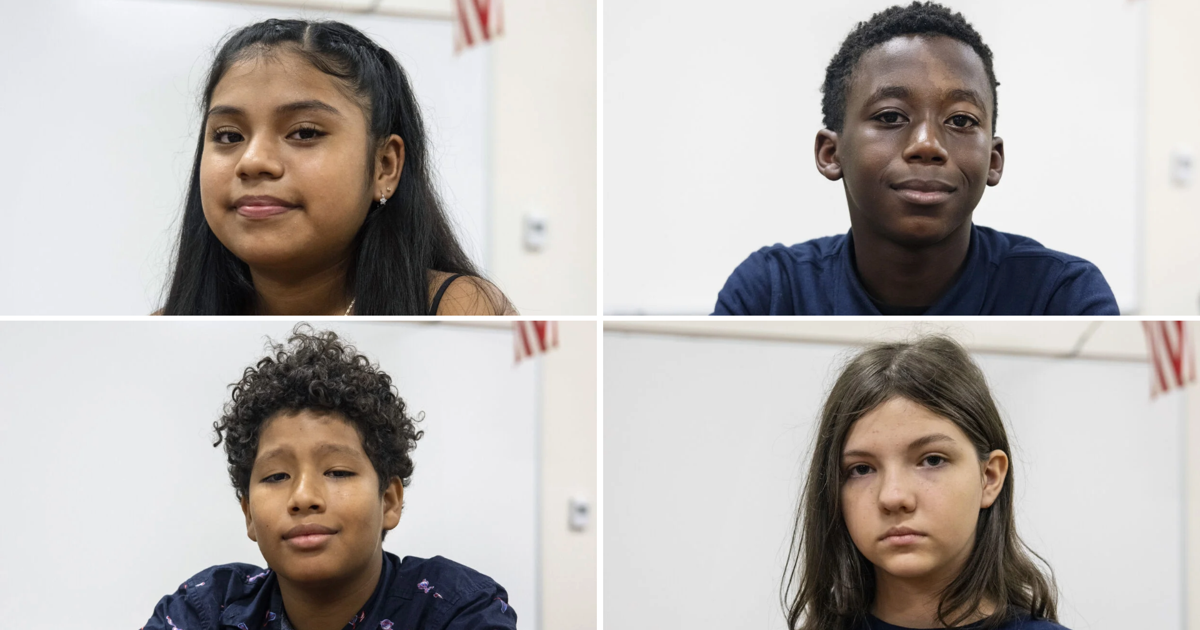
When Aiden sees himself, he sees the birthmark on his face. He notices the way it travels down his forehead, curving toward his left eye. It almost disappeared after the bike accident. It hurt him when he was bullied for it in the first grade.
“Don’t let that get to you,” his mother told him. Now his birthmark is the start of a poem that traces his life, from walking at 2, the bike crash at 7, a bus accident at 10 and the car accident and surgery that kept him out of school for two weeks.
At first, he didn’t want to write the poem. He thought it would be bad. He worried that his classmates would mock it. He didn’t think he was a good writer.
When he showed an unfinished version of the poem to his mom, she encouraged him. Include more details, she suggested. His brother helped him find the right words. And an editor taught him how to make the poem stronger.
I am from a heart that doesn’t stop, / From pain I pushed through, / From goals I still chase, / And dreams I won’t give up on.
Aiden, an African American, wanted the verses to show the world what he already knows: he’s no quitter.
I am from strength, / From never giving up— / No matter what.
Aiden’s poem is part of “Portraits: Our Untold Stories,” a student poetry anthology written by fifth graders at Pinehurst Elementary School in North Charleston. The project doubled as a tool to connect parents to the school and involve them in their kids’ education.
The book is the result of a year-long writing project carried out last school year. It includes the stories of 150 fifth graders. Their poems, written in both English and Spanish, were based on George Ella Lyon’s “I Am From” framework, a writing prompt that invited students to describe their identities and experiences by including personal details.
The pages explore themes like identity, family, belonging, friendships and students’ dreams for the future.
It all started with Welieides Moreira La Porte.
The power of voice
As a family service advocate, La Porte’s job, amongst other things, is to support the families of English learners at the school. She approaches her mission with the simple determination of connecting home to school, and school to home. She speaks Portuguese, Spanish and English.
“You go and support the families with whatever needs they have, if it’s food, if they’re late on their rent, water, I mean, you name it,” she said.
A family needs to take their kid to the dentist? She is there to help. Mom is pregnant and needs prenatal care? She drives her to the appointment.
Still, she worried about the students. She heard how they spoke — unmotivated, hopeless and weighed down by poverty. She wondered how could they dream beyond their realities.
“I wanted them to know that their story, their voice, their words have the power to change them, to shape their future,” La Porte said.
In 2023, she came up with the idea for a student writing project. What if a book told their stories, she thought. Writing would be cathartic and help kids understand that their experiences and feelings are important and worth sharing with the world, she said. The project also could connect the school to families, involving parents in the project.
So she bought a book-binding machine, but things got busy and she had to put the idea on hold.
A year later, La Porte went to an education conference organized by Georgia Southern University and attended a session about the power of storytelling. The discussion was led by Marina Rivera Gillmore, the founder of Full Circle Press, an independent publishing house in Oklahoma.
During the session, La Porte cried thinking about her yet-to-be-realized book project and her students’ untold stories. Afterward, she approached the publisher with the idea.
Belonging
Since the first grade, Kaylee always felt like she belonged at Pinehurst. Her teachers encouraged her to think positively, no matter what.
She thought her poem could start that way. Hopeful. But she also wanted to honor her parents.
Whenever she asks them for help, they are always there. They believe she can one day go to college, get a scholarship. One day, she wants to be a pediatrician, because she loves working with little kids.
Her parents didn’t have the chance to go to school when they were younger, she said, so they are willing to do whatever it takes to see her succeed.
She’s 11, but Kaylee already understands the meaning of sacrifice.
I am from struggle and strength, / From hardworking parents who left behind fear / To build something better.
Her mom and dad came to the United States from Mexico years ago because they wanted a better life for their children.
Throughout the monthslong writing process, Kaylee kept the poem close to her chest, only showing it to La Porte. Before that, a classmate had peeked at it and said it was not good enough.
“It’s what I came up with and it’s my life,” she said.
Still, she wrote and rewrote sentences to make sure the words matched her feelings.
I am from the streets of Charleston / And the memories of Mexico. / I am from family, from resilience, / and from dreams that stretch into new beginnings.
Untold stories
As soon as the 2024-2025 school year began, La Porte told Paul Pallagi, Pinehurst’s principal, about the book project.
Multilingual students at Pinehurst comprise 77 percent of the student population, the largest in the state, Pallagi said. He thought the project would help shine a spotlight on the school’s diversity.
“Yes, we have a large Latino population, but what makes Pinehurst so special is that every single student brings their own unique story and heritage to our school family,” he said. “Learning about the rich cultures and countries represented here is not only inspiring, it’s also a powerful way to strengthen the bonds between our teachers, families and community.”
Turning the project into a published book required resources. The project’s total cost was around $25,000, covered by Title I funds. These federal dollars support public schools nationwide with large populations of low-income students.
The money can be used to help pay for creative and innovative programs that get parents involved in their children’s education, a goal at the heart of the project.
Once the district approved the book project in the winter of 2024, it was a race to get the poems completed by the end of March if they wanted to get 400 copies printed and delivered to the school by early May.
To protect students’ privacy, all poems were published using their initials rather than full names. La Porte said the decision was made so the kids could safely share details about their lives while still having their voices heard.
At school, students wrote the poems with the help of librarians, a handful of teachers and parent volunteers. At home, siblings and parents chimed in, too. The publisher provided editors to help.
While some of the young writers found their flow, others struggled to get their thoughts on the page. They couldn’t find the right words, or hesitated to share their deepest hopes and dreams. That’s when La Porte stepped in to help.
“I had to put myself outside of the instructor (role) and become a real person for them,” La Porte said.
She recalled a student who said his dream was to become a soldier but did not think he would ever achieve that. La Porte pulled up photos on her phone from the time she served in the U.S. Army. The child’s eyes lit up. He looked at her in disbelief.
“There’s no such thing as impossible; this can be you, too,” she told him. “The world must know that there is one more person out there who wants to protect them, who wants to serve a country that’s not even his own.”
So the boy began typing away.
La Porte repeated the process with many other kids. It was a life-changing, beautiful, but difficult experience, she said. On more than one occasion, La Porte walked to her car at the end of the day in tears, thinking about the struggles some kids faced.
The kids knew from the start that their writing would end up in a book. Still, the stories uncovered things about students that adults at the school couldn’t even imagine.
Such was the case with Callista.
Loss
Callista cried a couple times while writing her poem. She still does sometimes when she remembers her dad, whose health failed him in January — soon after Callista turned 11.
“It just takes a bit to get over it,” she said of his death, wiping tears from her cheeks.
I am from stories he told me, / Stories of his growing up, / Woven like blankets I still hold close.
La Porte helped her a bit, she said, but for the most part, she wrote the poem on her own and kept it to herself.
Individual writing sessions helped Callista cope with her grief, said La Porte. Teachers were shocked when they read her poem. They did not realize the girl, so quiet and composed, had been carrying the loss of her father for months without telling anyone.
“If you had a traumatizing past, some kids might have that, too,” Callista said. “But it might be even worse than yours,” she said in defense of why adults should read a book written by 11-year-olds.
Callista, who has Japanese and Italian roots, wants people to actually think of her loss and what she lived through when they read her poem, not just glaze over it.
“Just read the words and take the meaning behind them with you.”
For her, that meaning is her dad.
Looking ahead
The books arrived in early May.
Pallagi, the principal, said he initially had envisioned a small picture book with a few select poems. He did not realize that every fifth grader would have the chance to publish their work.
As he read through each poem, he learned more about his students and gained a deeper appreciation of the power of story, he said.
“At a school like ours, we know there are many environmental and outside factors that can influence the outcome of projects,” he continued. “But this experience shows that with strong support, our students can create something truly monumental.”
When the boxes of books showed up at the school, students gathered in La Porte’s office. The room erupted in cheers when the first book came out of the box.
“I told you it was a real book,” La Porte told them.
Some students hugged the book. Others kissed it. Many flipped through the pages searching for their poems.
Soon after the book’s arrival, the school organized an event where it was unveiled and signed by the students. More than 200 people — parents, siblings, teachers — showed up.
School leaders are looking forward to repeating the project this year.
La Porte said the intention never was to sell the book for profit. Her goal is to create a nonprofit organization, and to use money from future book sales to fund a scholarship that helps students gain access to higher education opportunities.
To La Porte, the possibilities are endless.
“I look at this book and I see hope,” she said. “Every single story here talks about hope, resilience. It’s different stories, but they all have the same message: I want a better life.”
Hope
Joshua dreams of becoming president. He wants to change the world. His poem imagines a country of acceptance, not expulsion. The 11-year old is from Honduras.
I am from hope / From a heart that believes things can change / I am from people who are discriminated against just because of where we were born.
When Joshua found out about the book, he didn’t want his poem to stand out. English is not his first language. He wanted his poem to sound like everyone else’s. But then he thought again.
“So I started writing and typing and researching how people were being treated and what things would help them to progress in this country,” Joshua said.
I am from my mom’s wisdom / From the fear of being left behind / Of being a child without a home / Of missing the people I love most.
A teacher helped him find the right words. At one point, Joshua wondered if he should change “el tema,” the subject. He asked his mom what he should do.
“She said that it was OK if it came from my heart,” he said.
So he kept writing.
I am from talent that shouldn’t be wasted / From voices that deserve to be heard / So many who just need a chance.
When Joshua got the book, he showed it to his mom, uncle and dad.
They felt “orgullosos,” he said.
Proud.



